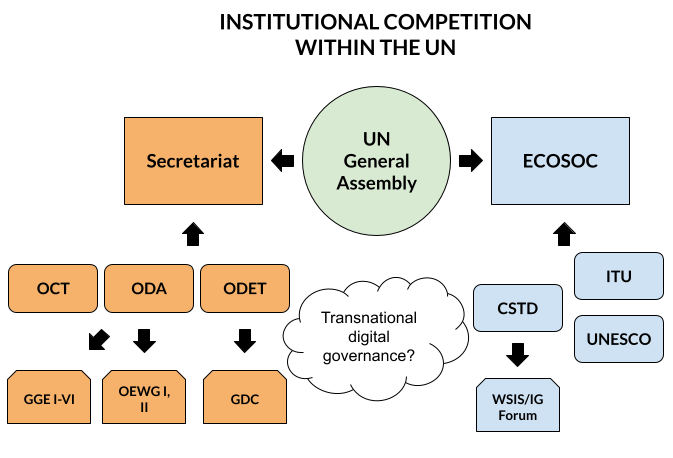As we approach the 20th Internet Governance Forum (IGF) in Lillestrøm, Norway, a pivotal question looms: how will the United Nations system reconcile two competing efforts to shape global digital governance—the legacy of the World Summit on the Information Society (WSIS) and the newly adopted Global Digital Compact (GDC)? Behind this lies a deeper institutional struggle, as different UN organs vie for influence, resources, and relevance. This blog provides background on that contest and sets the stage for our forthcoming paper on WSIS and the future of digital governance.
We start with a recent organizational innovation at the UN. In Jan 2025, the United Nations Secretary-General’s Envoy on Technology, Amandeep Singh Gill, transitioned to the newly created UN Office for Digital and Emerging Technologies (ODET), housed within the UN Secretariat based in New York. The historic development of a new office flowed from a decision by the UN General Assembly in December 2024, following the UNGA’s adoption of the Global Digital Compact (GDC) at the Summit of the Future in September 2024. Gill also serves in an ex officio capacity on the Internet Governance Forum (IGF) Leadership Panel, thus facilitating IGF and GDC collaboration.
 However, according to long-time observers of the UN and IGF (and consistent with organizational bureaucracy scholarship), the ODET views the WSIS as competition. Of course, ODET does not say that aloud. But they also tend to emphasize that the GDC is more “recent” and relevant, being linked to the 2024 Pact for the Future and the 2015 Sustainable Development Goals (SDGs). The WSIS and Internet Governance Forums link to the SDGs has always been one-directional, as a result of a misstep(?) by the UN Secretariat in New York when the SDG process failed to acknowledge the WSIS’ impact. On the other hand, the WSIS and Internet Governance Forums have always tried to integrate with the SDGs, even though the SDGs emerged from the Rio+20 process and hardly concern digital governance.
However, according to long-time observers of the UN and IGF (and consistent with organizational bureaucracy scholarship), the ODET views the WSIS as competition. Of course, ODET does not say that aloud. But they also tend to emphasize that the GDC is more “recent” and relevant, being linked to the 2024 Pact for the Future and the 2015 Sustainable Development Goals (SDGs). The WSIS and Internet Governance Forums link to the SDGs has always been one-directional, as a result of a misstep(?) by the UN Secretariat in New York when the SDG process failed to acknowledge the WSIS’ impact. On the other hand, the WSIS and Internet Governance Forums have always tried to integrate with the SDGs, even though the SDGs emerged from the Rio+20 process and hardly concern digital governance.
Do the powers within the UN know there is contestation? Absolutely. A commonly heard refrain is that the Geneva/Paris agencies are very concerned that they will lose “control” of “digital” to NY. These kinds of debates are not new, the Secretariat’s emphasis on operationalizing economic and social work emerged in the 1950s. Recently, ECOSOC’s Commission on Science and Technology Development (CSTD), which oversees the WSIS and IGF, and other agencies like the ITU and UNESCO, have pulled together. In the view of some, they are finally collaborating more effectively. But it is unclear whether this will last. They have lobbied member states to insist that there be WSIS-GDC integration. Understandably, member states don’t want to have to deal with both. The question now may be, what integrates into what? One vision is WSIS/IG Forums merging into GDC, with the latter becoming the “implementation platform”. An alternative is that the GDC could merge into WSIS, with WSIS/IG Forums remaining the implementation platform that now also includes GDC objectives and targets.
Perhaps concerns over diminished relevance and losing turf to UN Secretariat-based efforts are justified. During the same period, the Secretariat’s Office for Disarmament Affairs (ODA) facilitated ongoing discussions with varying levels of stakeholder participation on a directly related topic, cybersecurity (see GGE and subsequently, the OEWG I&II). These and other efforts (including DESA, which supports the IGF) are not without controversy, and outputs may be of limited value in constraining states’ behavior, but they have produced consensus reports with conclusions and recommendations. Maybe ODET sees a similar opportunity, hoping to create vehicles like multistakeholder Working Groups with consensus outputs on GDC-flagged issues like digital economy, digital public infrastructure, information integrity, and data or AI governance. The WSIS/IG Forums and GDC might take note of others’ participatory and productivity successes and shortcomings (and vice versa).
The more likely scenario, given bureaucratic inertia, is that both the WSIS/IG Forums and whatever platform ODET devises for the GDC continue in parallel, generating little integration. Reinforcing institutional silos risks diluting stakeholder influence and better understanding of overlapping issues and the consequences of policy choices. If the silos and deficienies cannot be overcome, perhaps the discussion of pressing transnational digital governance issues needs to move on from the UN.
The post Backgrounder: WSIS and the UN institutional landscape appeared first on Internet Governance Project.